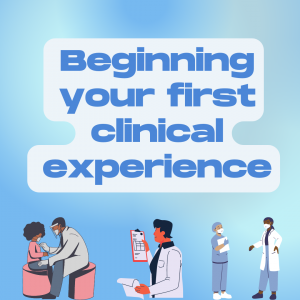By Keely Greiner, Health Professions Peer Ambassador
A lot of students find it daunting to begin their first clinical experience, especially if they will be working with patients directly for the first time. I remember being terrified, shaking and palms sweating, the first time I walked into my hospital. But, I kept an open mind, always asked questions, and took every opportunity to learn. I was flexible, I communicated with my coworkers, I helped however I could, and now I’m very confident in my work. I also have a much stronger stomach.
I’ve also learned to assert myself more—something I found difficult for some time due to my age and lack of experience. While it’s important to be respectful, you need to know when to put your foot down. You need to be able to say no, to insist, to step in. I think I have literally saved lives by asserting myself. You have to let your coworkers and patients know that you’re serious.
Those first few months were ROUGH though. I walked into the hospital every day unsure of myself and walked out feeling like an idiot. I was so hard on myself for not knowing how to do all these things I’d never done before. In addition to learning to be nicer to myself (after much encouragement from my therapist that I was actually taking all of the pandemic-hospital chaos very well), I gained skills and confidence with time. You’ve just gotta stick with it.* Those first few months, I contemplated quitting every day. I’m glad I didn’t.
If I can offer you any advice, it’s to stay open, be humble, and keep showing up. You’ll get to the point where you don’t have panic attacks on the way to work (speaking from experience)–it just takes time and practice. Eventually, you will feel competent and not out of place. You’ll be able to anticipate needs, take initiative, and assert yourself.
If I can offer you a second piece of advice, perhaps more important than the first: bring a full change of clothes to work, including socks and shoes. You don’t want to be squeaking around in pee-soaked sneakers for the last few hours of your shift. Learn from my mistakes.
Also, hydrate often and take your breaks! You should get 15 minutes of break for every 4 hours of work! Eat and rest!
*Disclaimer: In stressing persistence, I don’t want to make anyone feel like they have to put up with a truly awful situation. You shouldn’t be expected to put up with unsafe conditions, toxic workplaces, long working hours without proper compensation, and inordinate pressure. If any of these things are the case, or if working is putting too much strain on your life, you might want to reduce your hours or find something else to do. You’re allowed to quit a terrible job or volunteer position. Know yourself. Prioritize yourself. Trust your gut if something feels wrong. And reach out if you’re not sure. The Pre-Medical and Pre-Dental Advising Office is here for you. Good luck!
Keely is a senior in the honors program with an individualized major, health systems and disparities, and a minor in asian studies. Click here to learn more about and connect with Keely.